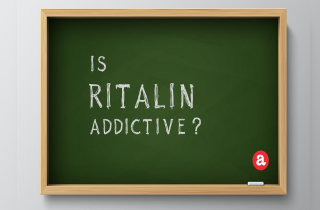YES. Ritalin is addictive.
While most Ritalin prescription dosage strengths begin with lower, cautious amounts, Ritalin can provoke dependence in the body and brain. Ritalin lasts how long? Ritalin lasts for 3-4 hours in its immediate release form and up to 7-8 hours in its extended release form. So what makes Ritalin so addictive, and how can you tell if you have a Ritalin addiction or just a physical dependence? We’ll review these questions here. We even invite your questions about Ritalin at the end.
What is Ritalin used for?
Ritalin is used to treat Attention Deficit Hyperactive Disorder (ADHD) in both children and adults. However, Ritalin is also abused recreationally for its stimulant effects. In fact, Ritalin can cause feelings of euphoria and getting high on Ritalin is increasingly popular among youth. Plus, Ritalin is used illegally for its performance enhancement qualities. Many college students will use Ritalin and similar medications as a “study aid” to help them avoid sleep or focus on the subject at hand.
What is Ritalin made of?
Ritalin contains methylphenidate, a strong stimulant which is similar to, but not as strong as, methamphetamine. Ritalin comes in several dosages and formulas. There is an immediate release version of Ritalin, a sustained release, and an extended release. Each version of Ritalin releases methylphenidate into the body at different rates and has a different duration of action.
How addictive is Ritalin?
Ritalin is very easy to get addicted to if you’re not taking methylphenidate to treat ADHD. There’s no evidence to suggest that people using Ritalin to treat ADHD normally develop an addiction to their medication. This is true even for people who take Ritalin for many years. Many people with ADHD find it impossible to function without Ritalin, but this isn’t necessarily a sign of addiction so much as a symptom of severe ADHD. Factors which make it easy for some people to develop a Ritalin addiction are:
- ease of acquiring Ritalin
- prevalence of Ritalin in schools and on college campuses
- Ritalin’s illegal diversion history
- Ritalin dependence vs. addiction
There’s little difference between Ritalin dependence and a high tolerance for Ritalin in the clinical sense. People using Ritalin to treat ADHD don’t develop a tolerance to the therapeutic effects of the drug, and don’t tend to manifest physical dependence in the medical sense of the word. Rather than suffering from withdrawals when they can’t have their medication, people with ADHD merely suffer from the symptoms of the disorder without Ritalin.
However, people who abuse Ritalin to get high, stay focused, or stay awake can easily develop a tolerance and physical dependence on methylphenidate. They may even develop a psychological dependence for methylphenidate and need Ritalin to cope with everyday life, even though they have no medical condition which would cause them to need Ritalin on a daily basis. This psychological factor is what characterizes the difference between physical depedence and addiction to Ritalin.
How do you get addicted to Ritalin?
Ritalin addiction is usually a result of illegal Ritalin abuse. Ritalin addiction is more likely to occur if you take it without a legitimate medical reason, take it in very high doses, or have a previous history of drug and alcohol abuse.
The medication has very different effects on people with ADHD than the rest of the population, serving to help sufferers focus more easily and stay calm and relaxed. They don’t really experience the euphoric or stimulant qualities of Ritalin that makes it so attractive to other people.
Signs of Ritalin addiction
Ritalin addiction involves a strong psychological component of obsessive thinking, or compulsive cravings. If you’re wondering if you have an addiction to Ritalin, ask yourself:
- Am I continuing to use Ritalin even though I suffer negative consequences for doing so?
- Do I crave Ritalin?
- Do I feel the compulsive need to take Ritalin on a regular basis?
Ritalin addiction potential questions
Do you still have questions about Ritalin addiction potential? Please leave them here. We are happy to help answer your questions personally and promptly. If we do not know the answer to your particular question, we will refer you to someone who does.









Related Posts